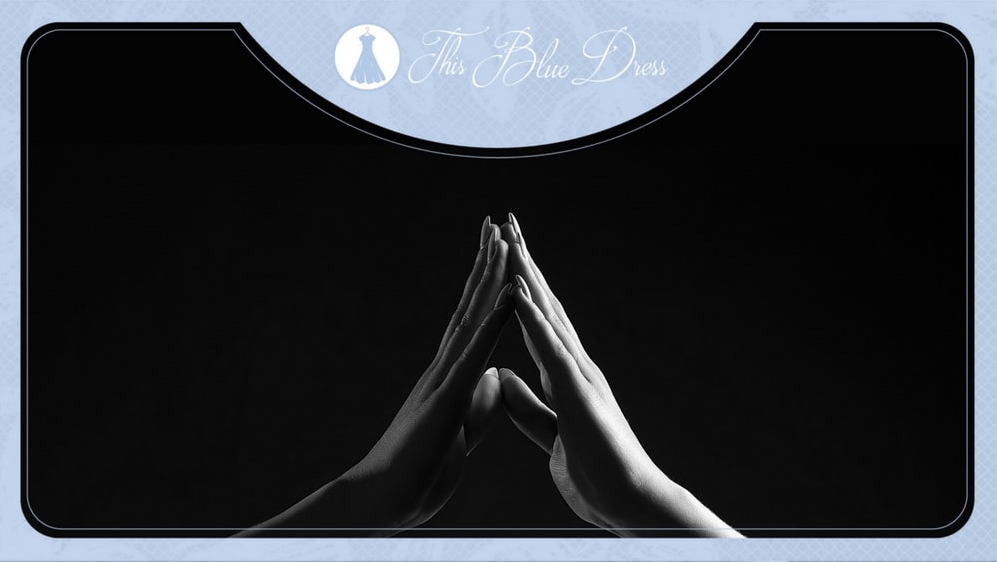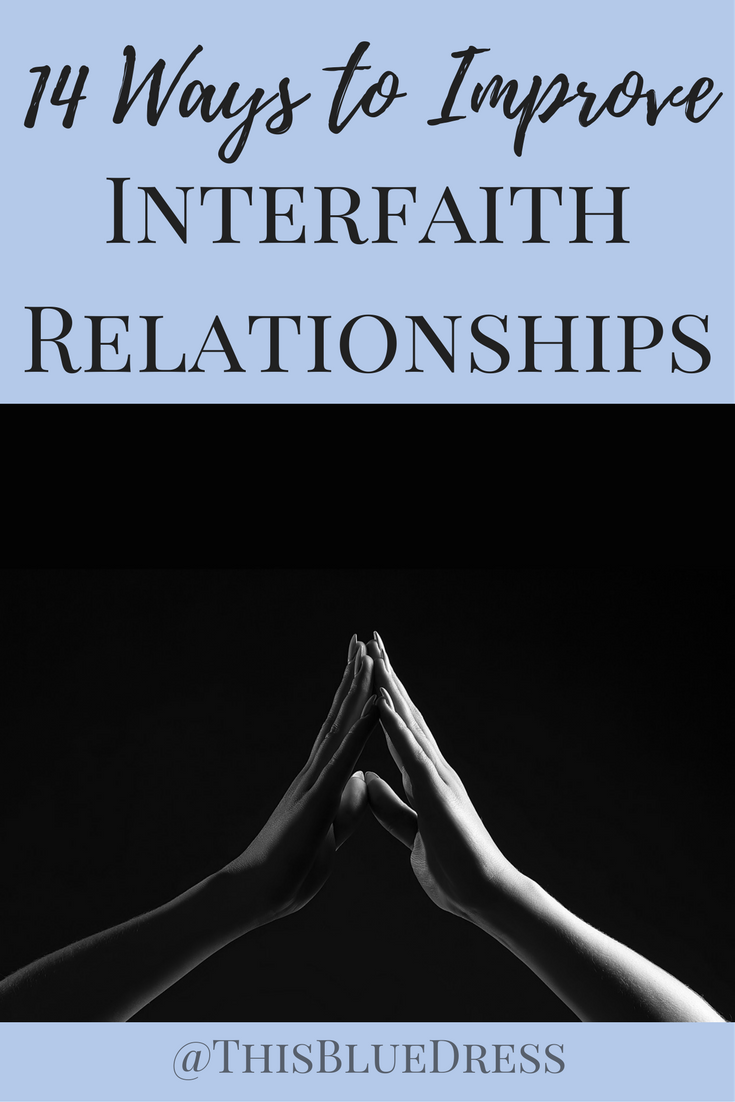Author’s Note:
Recently, I sent a 10 question survey to several people of varying religions to help me as I wrote these posts. I’ve included some of the responses to the survey and some of my own experiences in Part 1 and Part 2 of this topic. This is Part 2.
A special Thank You to Nancy (Methodist), Jacob (Seventh Day Adventist), Sara (Orthodox Christian), and Kathryn (member of The Church of Jesus Christ of Latter-Day Saints) for your participation.
14 Ways to Improve Interfaith Relationships

1. Find Common Ground
“When we reach out to others and get to know them regardless of their race, religious affiliations or appearance, we see that we really are more alike than we are different.” –Kathryn (The Church of Jesus Christ of Latter-Day Saints)
Of course, there are many differences in doctrine and culture among religions and belief systems of the world! However, most have an important common interest:
Jacob (Seventh Day Adventist): [We should] live like God lived when He was here on earth, serve others and follow His commandments.
Sara (Orthodox Christian): We are to treat all people as God’s creation, made in His image.
Nancy (Methodist): We are to love God with all our hearts, souls, and minds, having no other God before Him. Love our neighbors as ourselves. We are to introduce Christ to all we can.
Kathryn (Latter-day Saint): We should mourn with those that mourn, comfort those that stand in need of comfort, bless others, lift others.
Notice everyone said something about Loving, lifting, and serving others.
I strongly believe these are all things we can unite on, regardless of differences of religion.
When our focus is placed on our similarities, we can have more positive experiences together, like the one I had at a Southeast Baptist church last year.

2. RESPECT
“God created all of us. I would hope that there would be respect for each other’s beliefs.” –Nancy (Methodist)
You do not have to agree with someone, or even like them at all, to respect them. Respect is treating things that are sacred to others as sacred in their company. Respect is avoiding harm. Respect is consideration for each other as human beings. Respect fosters trust and love, leading to stronger interfaith relationships.
3. Seek Understanding From the Correct Sources
“So much of fear and hate are borne out of misunderstandings and ignorance.” –Kathryn (Latter-day Saint)
Of course, there are going to be misconceptions about all religions, considering how many different ones there are. The problem is a lot of these misconceptions can stir up hate, fear, and lies.
For example- because of many terrorist groups that have ties with Islam, peaceful Muslims are wrongfully harassed.
A recent Facebook post from an Islamic center in Tennessee condemned the terrorist attack in New York and emphasized that Islam is a religion of peace.
When I see posts like this and hear about the fear many Muslims live in, I am compelled to seek more understanding about the differences between the various Muslim groups. If I rely only on other uneducated people and the media for information, I will be told what to believe and feel and will remain ignorant.
We need to be responsible for educating ourselves as best as we can about the religious views of others so we can understand better, love better, and be better equipped to resolve problems.
But how do we know where to go to get the correct information about religious groups? Here are some tips:
- Official websites of church organizations are usually your best bet for internet research. These sites typically have free resources to help understand basic church doctrines and beliefs.
- Ask sincere questions from multiple, devout members of a specific organization. Don’t assume because you know one person associated with a group that you know everything about the religion.
- Attend several services/meetings of the religion of study
- Read the official books used in the teachings and studies of a specific group

4. Stick up for each other!
If you are aware of someone being harassed or demeaned because of their religion, call the perpetrator out! Confront hate when you see it. Listen to and support those who have been hurt.
5. Forgive
“We as members of religious communities should practice forgiveness in every relationship we have.” -Jacob (Seventh Day Adventist)
We will be offended or hurt in our lifetime. If we do not keep our emotions and actions under control, we can be consumed by hatred and bitterness.
In 2016, Pope Francis declared that “the world needs forgiveness; too many people are caught up in resentment and harbor hatred because they are incapable of forgiving. They ruin their own lives and the lives of those around them rather than finding the joy of serenity and peace.”
Forgiveness can help heal wounds caused by others or soften hard hearts. Our friendships can be preserved. We can be liberated from the poison we would otherwise harbor by choosing the higher road of forgiveness.
6. Eliminate Fear of Religious Conversations
I think we have two main concerns about sharing beliefs with others: 1) Are we going to be reprimanded or ridiculed for our beliefs? 2) Is the friendship with someone going to get weird or estranged after we do share?
Most people have experienced these things, whether they are Atheist, Christian, Muslim, Non-denominational. And it is hard to share things so close to our hearts when we don’t know how it will be received. Our belief systems are a huge part of what makes us, us!
So more often than not, we don’t share our beliefs because of that fear. We don’t ask others about religion because we don’t want them to feel uncomfortable. This fear can prevent us from having some of the most important conversations we can have! As Nancy said in part one, “There is so much to learn from each other.”
All four people that answered my questionnaire stated that they love to share their faith with others, as long as there is genuine interest, and if the inquirer is respectful. Learning this leads me to believe that people are more open to religious conversations than we think.

7. Listen! And I Mean, Really Listen.
“We can only show them the love of Christ if we take the time to listen to them and show them His love through our actions.” -Sara (Orthodox Christian)
If we’re predominately thinking about what we will say after someone is done talking, then we’re not really listening. It’s great to share beliefs with each other, but to ask someone about their religion just so we can only talk about ours is terribly misleading and frankly, rude. Plus, what can we learn if we don’t listen?
8. Eliminate Prideful Thinking
If you are familiar with the Bible, you probably remember the Pharisees, the religious group who followed strict rules and doctrines, but were prideful and self-promoting.
Most of us have been a Pharisee at some point in our life in some way or another, intentionally or not. I know I have, and I cringe when I think about it.
Orson F. Whitney (1855–1931) stated, “God is using more than one people for the accomplishment of his great and marvelous work.…It is too vast, too arduous, for any one people.”
This should be great news! We have a lot of work to do to make the world a better place, but we don’t have to do it alone.
I really loved this article from Samuel Hislop about a time he realized that he was being prideful. He gave us a great reminder about God’s relationship with people outside of our faith:
“God loves them, and is helping them too.”

9. Sharing is Caring
If you ate at a great restaurant or saw a cool movie, don’t you tell people? Why?
Usually, it’s because you had a positive experience, and you want others to have that too!
I think when others share their religion or belief system with us, we should be honored! That person cared enough about us to want us to take part in something that makes them happy. I am always pleased when I get an invite to another church service or event, or when I receive a religious gift from someone, as long as I can tell it was given out of love.
I have given several copies of The Book of Mormon to some friends throughout my lifetime. The most important thing to understand about my choice to give them the book was the nature of my intention. I didn’t give it because I thought my friends were wicked and I was perfect and that they needed to be more like me. I gave them the book because it’s one of the things most close to my heart. I cared so much about these people that I wanted to give them the message of hope, peace, and love that the book carries. It was simply a gift; no conversion required.
10. Be Kind
“We should strive to give people peace, a sense of belonging, love, respect, and help.” -Nancy (Methodist)
This kindness can change lives for the better! Jacob mentioned that the incredible, encouraging fellowship from his congregation was the very reason he believed and is directed towards God.
We need to make sure we are kind and as inclusive as possible- toward everyone. ALL faiths. ALL people.
If a missionary from another church shows up at the door, be kind even if you don’t want to hear the message. Remember the people that come to church in jeans or with rainbow hair are welcome too. Mother Teresa said it perfectly, “If you judge people, you have no time to love them.”
![]()
11. Work Together
One of the best ways we can form better relationships is to engage in service and activities together! We can unite in a good purpose and establish close friendships.
From my survey, I gathered these great ideas of events interfaith people can participate in together:
Nancy (Methodist): [I’ve been to an] interchurch council serving a community Thanksgiving dinner together. It was good to be surrounded by like-minded people. We are all people of Christ.
Sara (Orthodox Christian): There are events that I would like to participate in that are inter-faith, such as peacefully assembling outside abortion clinics and supporting the homeless and hungry in their time of need.
Jacob (Seventh Day Adventist): I have been in bible study with a group of believers, all of us are from different faiths. We are reading a devotional book and each week we meet and talk about how reasonable the book is, is the book Christ-like, and many other inflection questions.
Kathryn (Latter-day Saint): I have gotten to know many wonderful people through a volunteer group consisting of many organizations and individuals who came together to help refugees in our community from all backgrounds: Baha’i, Muslim, Catholic, Baptist and many more. I have taken my son to an Episcopalian church to make mats for homeless people to sleep on. We like to attend a Love Your Neighbor potluck twice a year that promotes understanding by getting to know others of different backgrounds. Our family attended a rally for a local mosque that was vandalized. We went to show love and support for our friends who were victimized, and it was a beautiful experience.

12. Share Beliefs and Serve Without Expectation of Conversion
“As we serve with others, certain guidelines can help us make our interactions more meaningful and avoid giving offense. I once lived in a large city and volunteered for a local church’s tutoring program open to the public—only to discover that the person in charge found my membership in The Church of Jesus Christ of Latter-day Saints unacceptable. That experience convinced me to value anyone’s contribution regardless of his or her religious affiliation (or lack thereof). I gratefully follow up on anyone’s interest in learning about the Church, but I also know that we Latter-day Saints take Jesus’s charge seriously to love our neighbor, clothe the naked, feed the hungry, and visit the imprisoned (see Matthew 25:34–36) without expecting the conversion of the recipient or those who serve with us. Sincere and respectful interfaith engagement never requires any group, including ours, to disavow its beliefs. Rather, it encourages participants to “contend against no church” (D&C 18:20) and “clothe [themselves] with the bond of charity” (D&C 88:125).” -Betsy VanDenBerghe, “Becoming Better Saints Through Interfaith Involvement”
I think she said it all.

13. Remember Their Rights
Many brave people fought and died for us to have freedom in the United States. Religious freedom in particular was so important to the Founding Fathers, that it was the first thing mentioned in the First Amendment of the Constitution. We should celebrate that we can choose how and who and where we worship, and allow others to peacefully to do the same.

14. Be Friends!
Have playdates, go out to lunch, go to a game! We should expand our social circles to include people outside of our faith! Some of my best friends belong to the Church of Christ, Methodist faith, Catholic faith, and many others. My life has been greatly enriched by these amazing people.

“When we look beyond people’s color, ethnic group, social circle, church, synagogue, mosque, creed, and statement of belief, and when we try our best to see them for who and what they are—children of the same God—something good and worthwhile happens within us, and we are thereby drawn into a closer union with that God who is the Father of us all.” -Elder Jeffery R. Holland
We all get to share this beautiful earth and amazing human experience together, so why not make the journey more enjoyable?
-Mariah
So what exactly do we benefit from interfaith friendships? Find out in Part 1.
To learn more about my friend’s religions, visit the following sites!
Sara (Orthodox Christian): https://oca.org/orthodoxy/the-orthodox-faith/doctrine-scripture/the-symbol-of-faith/nicene-creed, and also 5 Misconceptions about the Orthodox Church
Nancy (Methodist): http://www.umc.org/
Jacob (Seventh Day Adventist): https://www.adventist.org/en/
Kathryn and me (Members of the Church of Jesus Christ of Latter-Day Saints): Lds.org and Mormon.org



I really appreciated this post. I appreciated too that it didn’t put the emphasis on hiding your own faith to have better relationships with others. Too many times I think people think that’s the only way to get along with people who believe differently than you, and it’s not.
I firmly agree with you on that! Thank you so much for reading and for sharing your thoughts, Gale!